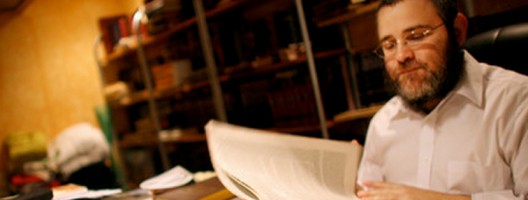This interview with Rav DovBer Pinson was published in the Jewish Book News (1999), in conjunction with the release of his book Reincarnation and Judaism: The Journey of the Soul.
Question:
Are there any references to reincarnation in the Bible or Talmud?
R. DovBer Pinson: Like so much in mystical Jewish thought, reincarnation has been both embraced and rejected. The Kabbalah was closely guarded for thousands of years, by those few who were privileged to gain entrance. Those verses in the Torah and Talmud that allude to reincarnation, were known to Kabbalists throughout the ages, and passed down as a tradition, from teacher to student. To those who were not privy to the inner secrets of Kabbalah, namely, the majority of the Jewish scholars, including the philosophers, the concept of reincarnation seemed foreign and strange. Therefore, the answer to your question would be yes and no, depending on whom you ask.
Question:
If reincarnation is a fundamental idea of Jewish theology, why do so few Jews believe in it? Even traditional rabbis often seem skeptical at best.
R. DovBer Pinson: This skepticism is not a new phenomenon, it actually stems from generations of debate over this little known, yet intriguing notion, of reincarnation. As I mentioned in my previous response, the debate over reincarnation was very much a controversy between the Kabbalists and Philosophers. Kabbalah means, literally, to receive. The traditions of the Kabbalah were not based on logical thought, rather, it was information transferred from one generation to the next, an unbroken chain since the original knowledge was taught, 3,300 years ago on Mount Sinai. Those who did not receive these well-guarded traditions argued against reincarnation based on their logical thought process. It did not seem to make sense to them, and being that they had not received it as tradition, they felt that it went against the Torah.
Many of the great Jewish minds disputed reincarnation. For example, Rabbi Saadiah Gaon himself argued against it. How-ever, there are signs that these great thinkers might have thought differently had they known of the tradition. Rabbi Chisdai Cresces, a well-known fourteenth century philosopher, spoke against reincarnation, yet he stated that if he were to have received it in his Kabbalah, he would have felt differently. The Abrabanel wrote that as Maimonides neared the end of his own life, he received Kabbalistic traditions which heretofore he had not known of. Maimonides stated, upon receiving these secret traditions, that had he known of these teachings earlier, he would have retracted many of his philosophical arguments.
Question:
Is belief in reincarnation a matter of faith or do you think that there is any real evidence of it?
R. DovBer Pinson: The term ‘real evidence’ in the issue of reincarnation, indeed in any matter of spirituality, is not definitive, rather it may refer to many things. There is empirical evidence, that which we perceive physically, and in matters of spirituality there is also the issue of spiritual evidence, that which is felt on a higher plane.
As to empirical evidence in the matter of reincarnation, there are those who bring memory of previous incarnations as conclusive evidence of its existence. However, as discussed at length in the book, this is not as clear cut as it may seem. According to Kabbalah, in fact, most memories of previous incarnations are not what they appear to be.
Spirituality, the definition being, that which is beyond our usual realm of sensory perception, is most commonly evidenced in spirituality itself. We are told that the Arizal, the famed Kabbalist, was able to see within each person’s soul their previous incarnations. This perception was as real to him as a physical sighting would be to most. Reality is but our perception of it. What is real to a person is based on his or her level of consciousness.
The Torah tells of a battle led by Joshua in which the Jewish nation was victorious. A miraculous battle, defying nature itself. The sun stood still in the skies throughout the battle, not setting in its proper time, allowing the Jews to emerge the victors. The Ralbag, a great Jewish philosopher, argued that the battle was won so quickly that it appeared that time had stopped and the sun stood still. However, it did not actually change its nature at that time.
The Maharal of Prague disputes this claim. He argued that the sun indeed stopped in its course, yet it was perceived only by the Jewish nation while the reality of other nations was unchanged and the sun moved on. A physical occurrence was experienced, yet simultaneously the perception of that reality was vastly different, depending on the spiritual level of the one who experienced it. We don’t see things the way they are, but the way we are.
Question:
Doesn’t the fact that reincarnation appears in Jewish texts rather late in Jewish history imply that this is a new development and not a fundamental idea of Jewish thought?
R. DovBer Pinson: There are many secular scholars who would disagree with fundamental beliefs in Judaism, based on their documentation at a later point in history than the revelations at Mount Sinai. There are famous dissensions regarding issues such as the resurrection of the dead, and the main thrust of their arguments is the delayed appearance of the subject in Scripture.
There are numerous fundamentals in Jewish belief that have never been clearly mentioned in the Five Books of Moses, such as belief in the afterlife, resurrection of the dead, and so on. Although these may not be spoken of in an overt manner, the ‘oral tradition,’ that part of the Torah which goes hand in hand with the written Torah, speaks clearly of these issues and sheds light on those passages in the Torah that allude to these concepts. Another fundamental premise in Jewish belief is that the oral tradition is one with the written and it is impossible to understand one without the other. Reincarnation is an ancient Jewish belief, passed down in the manner of the oral tradition, and in existence for as long as Judaism.
Question:
Do people come back as animals? Do men come back as women? Do Jews come back as non-Jews? Can you give us a brief sense of how it is said to work?
R. DovBer Pinson: The matter of reincarnation is always intriguing, yet seldom simplistic. These issues and countless more are dealt with in the course of this book. I invite you to explore the mysteries of reincarnation and hope that you will find it as fascinating and meaningful as I do. Reincarnation is not only an interesting issue to explore for the information itself, but it can have deep impact on each of our lives.
There are three types of people: those who define themselves by what they do, those who define themselves by what they have, and those whose definition of self stems from who they are. The study of this subject of reincarnation brings one to awareness that a shift of consciousness is in order. Rather than being occupied with what we possess, or what we do, we come to a point of discovering that which we are. To realize the destiny of our own unique and individual soul, and to fulfill that destiny in our lifetime.







